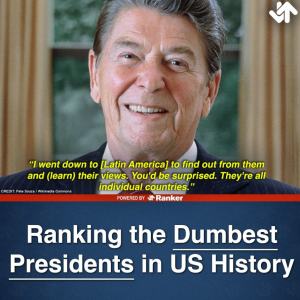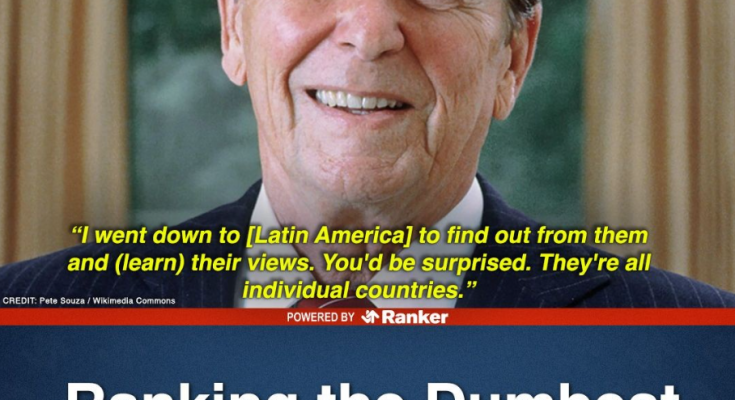The Dumbest Presidents in US History: A Look at the Leaders Who Missed the Mark
When Americans elect a president, they hope for intelligence, wisdom, and leadership skills. However, history shows that not every president has met those expectations. Some have been remembered less for their achievements and more for their blunders, misjudgments, or outright ignorance in certain areas. “Dumb,” of course, can be subjective — it can mean lacking political skill, ignoring expert advice, or making decisions that later proved disastrous. This isn’t about cheap insults; it’s about examining the moments where poor judgment overshadowed leadership.
1. James Buchanan — The Indecisive President
James Buchanan, the 15th president, often tops “worst president” lists, and for good reason. He inherited a country on the brink of civil war and essentially shrugged at the crisis. His belief that states had no right to secede was correct, but he also believed the federal government had no right to stop them — a contradictory stance that paralyzed action. While Southern states left the Union, Buchanan’s inaction allowed tensions to boil over, making Abraham Lincoln’s job almost impossible. Historians see his lack of decisive leadership as one of the greatest failures in American presidential history.
2. Warren G. Harding — The Scandal Magnet
Harding’s presidency (1921–1923) is remembered less for policy and more for the infamous Teapot Dome scandal, where government oil reserves were secretly leased to private companies in exchange for bribes. Harding himself may not have masterminded the corruption, but his inability to recognize and control the unethical actions of those around him made him appear politically naive. Harding himself admitted, “I am not fit for this office,” which might be one of the most honest assessments by a president about their own capability.
3. Franklin Pierce — The Man Who Lit the Fuse
Pierce’s presidency (1853–1857) is often criticized for pushing the Kansas-Nebraska Act, which allowed settlers in new territories to decide for themselves whether to allow slavery. This overturned the Missouri Compromise and reignited fierce sectional conflict. The decision led to violent clashes in “Bleeding Kansas” and accelerated the path to the Civil War. Pierce wasn’t unintelligent in the academic sense, but his political instincts were disastrously poor.
4. Andrew Johnson — The Reconstruction Disaster
After Lincoln’s assassination, Andrew Johnson inherited the presidency during one of the most critical moments in US history: the Reconstruction era. Unfortunately, he resisted nearly every congressional effort to protect the rights of freed slaves and rebuild the South in a more equitable way. His stubbornness and frequent clashes with Congress led to his impeachment (he narrowly avoided removal by one vote). Johnson’s unwillingness to adapt or compromise crippled post-war progress and deepened racial inequality.
5. Herbert Hoover — Blind to the Great Depression
Herbert Hoover entered office in 1929, just months before the stock market crash that triggered the Great Depression. While Hoover was actually a skilled administrator earlier in his career, his belief in minimal government intervention blinded him to the severity of the crisis. He relied heavily on volunteerism and private charity instead of aggressive federal programs. As unemployment soared and people starved, Hoover’s reputation plummeted. He wasn’t lacking in intelligence, but his inability to shift strategies when old methods failed cost him dearly.
6. George W. Bush — The Iraq War Misstep
George W. Bush’s presidency (2001–2009) will forever be tied to the Iraq War. While his leadership after the September 11 attacks initially boosted his popularity, the decision to invade Iraq in 2003 based on faulty intelligence about weapons of mass destruction is seen as one of the most costly foreign policy mistakes in modern US history. The war destabilized the Middle East, cost trillions of dollars, and took countless lives. Critics argue this was less about raw intelligence and more about poor judgment and misplaced trust in flawed information.
7. Ulysses S. Grant — The General Who Couldn’t Govern
Grant was a brilliant Civil War general, but as president (1869–1877) he was far less successful. His administration was riddled with corruption scandals like the Whiskey Ring and the Credit Mobilier fraud. While Grant himself wasn’t accused of personal corruption, his trust in unscrupulous associates and his failure to enforce accountability damaged his presidency. He was an honorable man but lacked the political sharpness to navigate Washington’s swamp.
8. Donald Trump — The Controversial Wild Card
Donald Trump remains one of the most polarizing figures in US history. Supporters hail him as a straight-talking businessman who shook up Washington, but critics argue that his frequent disregard for expert advice, chaotic decision-making, and reliance on inflammatory rhetoric weakened both domestic unity and America’s global image. From spreading false claims about the 2020 election to downplaying the severity of COVID-19 in its early stages, many historians and political analysts view his presidency as defined by misinformation and division.
9. Calvin Coolidge — Silent but Absent
Known as “Silent Cal” for his quiet demeanor, Coolidge (1923–1929) believed strongly in limited government — so much so that he essentially ignored signs of the coming economic collapse. His laissez-faire approach to the roaring 1920s may have fueled short-term growth, but it also left the economy vulnerable to the crash of 1929. While he avoided scandal, his unwillingness to take preventive action contributed to one of the darkest periods in US economic history.
Why “Dumb” Doesn’t Always Mean Unintelligent
It’s important to note that none of these men were truly “dumb” in the literal sense — they were all capable individuals in certain fields. The issue is that the presidency requires a unique blend of intelligence, judgment, adaptability, and empathy. Many of these leaders failed because they either could not recognize the moment they were in or refused to change course when their strategies failed.
Final Thoughts
The history of the US presidency is a reminder that intelligence alone is not enough to lead a nation effectively. Leadership requires humility, foresight, and the ability to listen — qualities that some presidents either lacked or ignored. These failures have shaped the course of American history, sometimes with devastating consequences. The lesson is clear: electing a president isn’t just about choosing someone with good ideas — it’s about choosing someone who knows when their ideas are wrong and has the courage to change.


